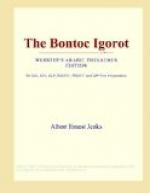August 9, 1901, when the Board of Health for the Philippine Islands was organized, Dr. Hunt, who had remained in Bontoc most of the preceding year, was appointed “superintendent of public vaccination and inspection of infectious diseases for the Provinces of Bontoc and Lepanto.” He was stationed at Bontoc. About that time another American civilian came to the province — Mr. Reuben H. Morley, now secretary-treasurer of the Province of Nueva Vizcaya, who lived nearly a year in Tulubin, two hours from Bontoc. December 14 Mr. William F. Smith, an American teacher, was sent to Bontoc to open a school.
Early in 1902 Constabulary inspectors, Lieutenants Louis A. Powless and Ernest A. Eckman, also came. May 28, 1902, the Philippine Commission organized the Province of Lepanto-Bontoc; on June 9 Dr. Hunt was appointed lieutenant-governor of the province. May 1, 1903, Dr. Hunt resigned and E. A. Wagar, M.D., became his successor.
The Spaniard was in Bontoc about fifty years. To summarize the Spanish influence on the Igorot — and this includes any influence which the Ilokano or Tagalog may have had since they came among the people under Spanish protection — it is believed that no essential institution of the Igorot has been weakened or vitiated to any appreciable degree. No Igorot attended the school which the Spaniards had in Bontoc; to-day not ten Igorot of the pueblo can make themselves understood in Spanish about the commonest things around them. I fail to detect any occupation, method, or device of the Igorot which the Spaniards’ influence improved; and the Igorot flatly deny any such influence.
The Spaniard put the institution of pueblo presidente pretty well throughout the area now in province, but the presidente in no way interferes with the routine life of the people — he is the mouthpiece of the Government asking for labor and the daily necessities of a nonproductive, resident foreign population.
The “tax” levied was scarcely in the nature of a modern tax; it was more the means taken by the Spaniard to secure his necessary food. In no other way was the political life and organization of the pueblo affected. In the realm of religion and spirit belief the surface has scarcely been scratched. The only Igorot who became Christians were the wives of some of the Christian natives who came in with the Spaniard, mainly as soldiers. There are now eight or ten such women, wives of the resident Ilokanos of Bontoc pueblo, but those whose husbands left the pueblo have reverted to Igorot faith.
In the matter of war and head-hunting the effect of the Spaniard was to intensify the natural instinct of the Igorot in and about Bontoc pueblo. Nineteen men in twenty of Bontoc and Samoki have taken a human head, and it has been seen under what conditions and influences some of those heads were taken. An Igorot, whose confidence I believe I have, an old man who represents the knowledge and wisdom of the




